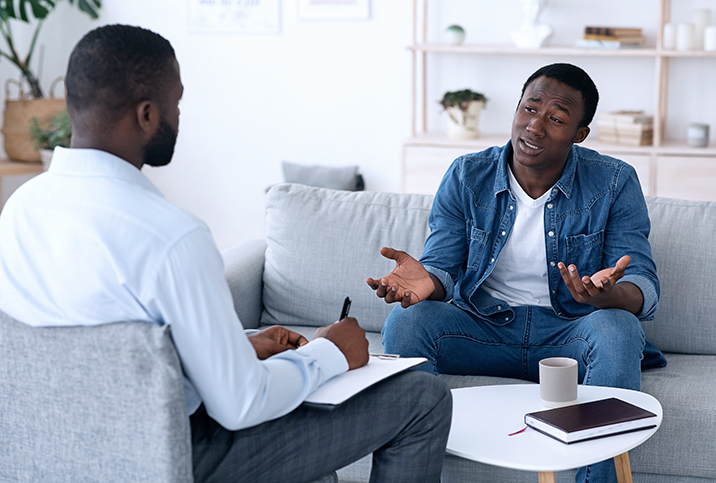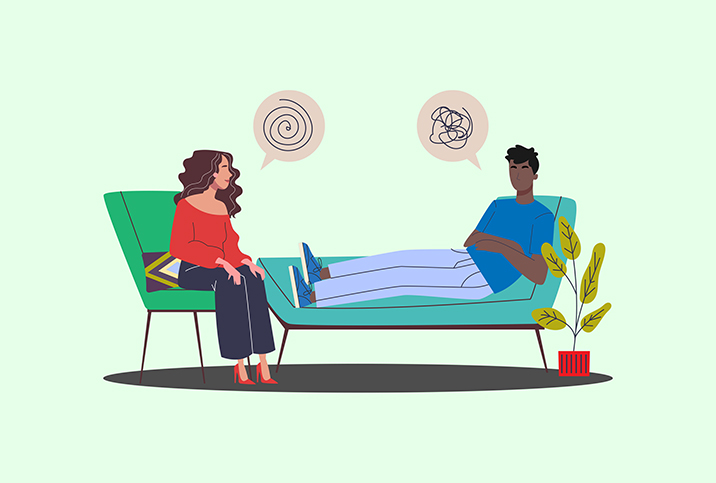Your Therapist Is Not the Right Fit. Now What?

Taking the step to seek therapy is an encouraging sign you're taking positive action toward addressing your mental health. But for many people, it can be a really scary step—and not for nothing.
The stress of finding the right therapist can feel overwhelming, not to mention it takes a lot of emotional energy and courage to be vulnerable with someone new.
So what happens when you've overcome all of those barriers, done your research, listened to recommendations and finally decided on a therapist, and then it just…doesn't work out?
We broke up
Experts recommend starting by identifying the reason it may not have worked out. Then reframe the experience in your mind so you can continue your mental health journey in a more positive way.
"Clients discontinue with their therapists all the time," said Michelle Groff, a licensed professional counselor who co-owns Fort Worth Counseling and Intervention with her husband in Texas. "Usually that occurs in them not scheduling another appointment rather than formally 'quitting' the therapist."
While "therapist breakups" are often initiated by the client, a therapist may also decide to no longer see a client, though Groff noted that in her experience, this scenario is less likely. When a therapist decides to stop seeing a client, it's typically because they feel they aren't equipped to address the client's particular issues.
"Counselors are duty-bound to refer a client out if they realize they do not have the skills to meet their needs," Groff said. "That knowledge might help if a client can see this as wisdom rather than rejection."
Brad Nowlin, a licensed family and marriage therapist who practices in Fort Worth, Texas, noted another reason a therapist may stop seeing a client.
"I'd say that we are human and sometimes get fatigued by people saying they want to change and then not doing what it takes to change," Nowlin said.
However, he added that sometimes the close of a chapter with one therapist can lead to a meaningful and productive connection with a new therapist.
"A fresh perspective from another therapist can sometimes make the difference," Nowlin said. "While it might be understandable to be emotionally upset, the reality is it is about best practices and helping people get better. So, no reason to take it personally as it's all about getting better."
Setting yourself up for success
There's no surefire way to guarantee things will work out with your therapist. However, certain strategies can increase your chances of successfully finding a therapist who can meet your needs for the long term.
"It can be a vulnerable thing sharing your struggles with someone you've never met," Groff said. "I think the best way to find the right therapist is to start by finding someone experienced and specially trained to treat the issue you struggle with. For instance, if you are struggling with an addiction, it would be good to find someone who has experience treating your addiction."
If you're seeking treatment for something like sex addiction, then you should search for a therapist who has specialized certification in sex addiction rather than substance use addiction, she added.
The same principle applies to conditions such as anxiety. Since anxiety can be generalized or specific, such as with obsessive-compulsive disorder (OCD) or trichotillomania (compulsive hair pulling), you're better off looking for a therapist from the outset who specializes in the specific form of anxiety you experience. That's because the treatment for each condition differs: OCD is typically treated with exposure and response prevention, while trichotillomania is treated using habit reversal therapy.
'Give yourself permission to try someone else if you feel uncomfortable after the first visit.'
When looking for a therapist, some people choose to try one at a time, while others may book multiple counseling sessions with multiple new therapists and then decide which one to stick with from there. Being able to compare therapists in real time can be helpful for some people, while others may benefit more from a focused approach.
While this choice comes down to personal preference and resources, Groff said she recommends clients try one therapist at a time.
"If you can, talk with a therapist or therapists on the phone prior to booking the initial appointment to get a feel of the interaction, but if not, give yourself permission to try someone else if you feel uncomfortable after the first visit," she said.
Once you've narrowed down your pool of potential therapists to those who specialize in your condition, those first few interactions—on the phone before your therapy session or during the initial sessions—are important. Ask yourself how you felt during the interactions and whether you think you could feel safe and comfortable enough to open up to this person over time.
"The best indicator of successful therapy is finding a therapist with whom you feel relaxed and comfortable and do not feel judged or shamed," Groff said. "Therapy is a relationship, and different personalities mesh better than others."




















